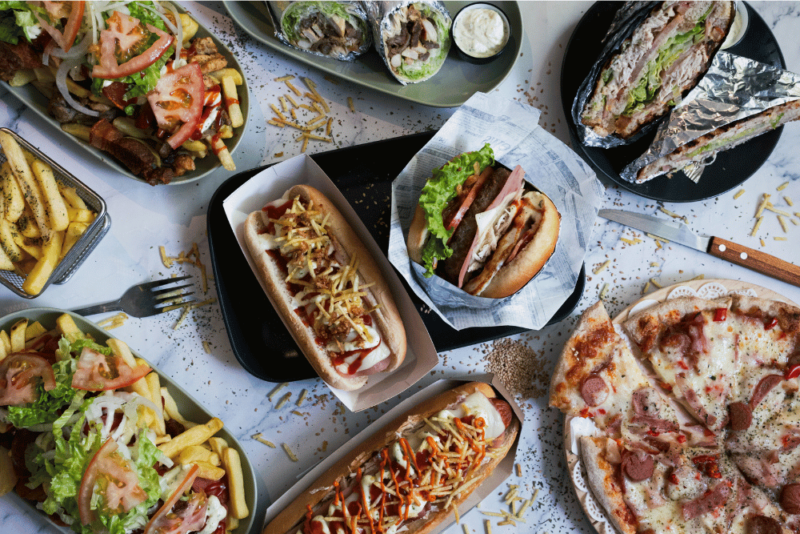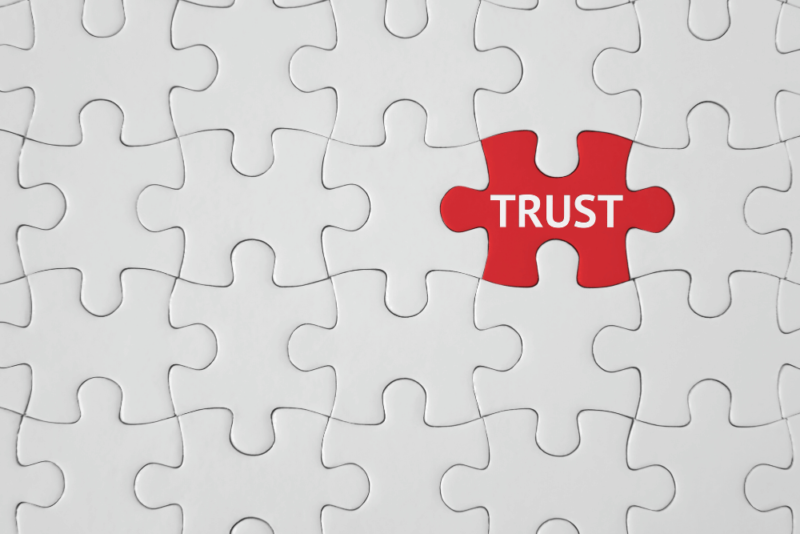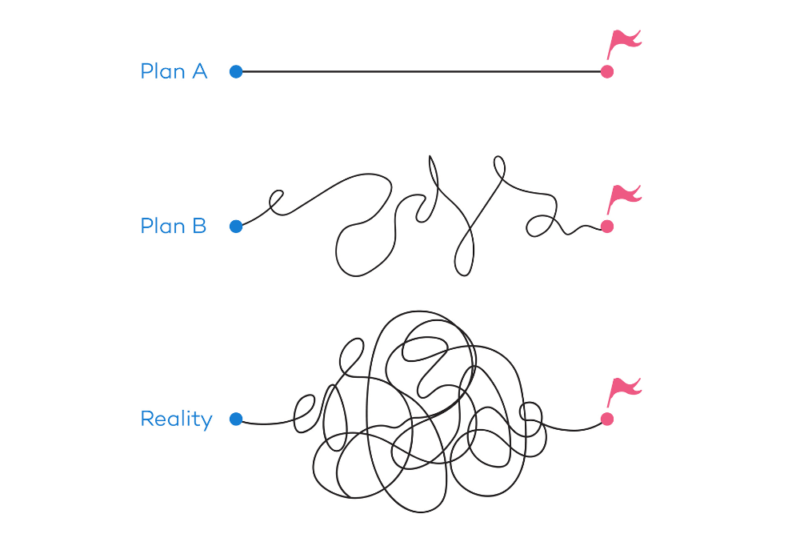
Does intuitive eating mean eating whatever you want, whenever you want, as much as you want? That’s certainly what many people believe. The simple answer is, “No.” But I also want to give a disclaimer.
That disclaimer is that as an adult with body autonomy, you have the right to eat however you want. If you really want to eat loads of cupcakes and potato chips all day, every day, then I support your right to do that. If you really want to eat loads of salmon and broccoli all day, every day, then I support your right to do that.
However, few people would truly want to do that. If nothing else, it’s because eating that way would very likely leave you feeling blech or bored or both. And such a limited diet would set the stage for nutrient deficiencies.
Even when you’re eating a fairly nutritious diet, if eating as much as you want leaves you feeling uncomfortably full every time you eat, you probably don’t want to keep doing that. Or maybe you do, and that fact distresses you, because it puts your mind in conflict with your body. This is not an unusual situation, but it IS one that takes a while to untangle.

The importance of attunement
What Intuitive Eating is really about is eating in a way that is satisfying AND leaves you feeling good.
You eat because you’re hungry (as opposed to ignoring or denying hunger because you “shouldn’t be hungry” or letting yourself become ravenously hungry).
You stop eating when you’re a degree of fullness that feels comfortable to you (as opposed to not allowing yourself to eat until you’re full or eating to overfullness because you know your next “scheduled” meal is a looong time away).
You choose foods that taste good (as opposed to choosing “healthy” foods that you don’t really like.)
You’re also choosing foods that helps your body feel good and function well. You’re eating with attunement.
Intuitive Eating is also about letting go of external food rules and ideas about “good” and “bad” foods, instead learning to notice, listen to and honor what your body and your tastebuds tell you about what is authentically right for you.
It’s about having a salad because that sounds good, not because it’s “healthy.” It’s about eating ice cream because you want something sweet and that’s exactly what would hit the spot — without accompanying it with thoughts of “I really shouldn’t be eating this.”
It’s the uniting of unconditional permission (the “Make Peace With Food” principle) to eat with attunement. Unconditional permission to eat with attunement can feel like chaos. Unconditional permission to eat with attunement can feel like freedom.

What if you have trouble trusting yourself?
Is this easy? Not for everyone. If you’ve been operating under shifting sets of food rules for years, whether in the name of controlling your weight or pursuing “optimal” health, trusting yourself rather than those rules can feel hard.
If you have a history of physical or sexual trauma or are a member of a marginalized group due to your skin color or physical ability, and this makes it hard to feel safe in your body, it can also make it hard to trust your body and its cues.
If you are neurodivergent, it may make it hard to notice some of your body’s internal cues.
If you are recovering from an eating disorder, you may not yet be able to rely on hunger cues as a sign your body need food, and you might experience early fullness/satiety even when you haven’t had enough to eat to meet your nutritional needs.
And if you have a health condition that legitimately means you need to avoid certain foods and/or would benefit from adding others, integrating that with the unconditional permission to eat part and even with the attunement part can feel especially tricky.
But it’s doable. It’s all doable.

Intuitive eating is a journey, not a sprint
One speedbump on the road to true food freedom is the fact that we’ve been conditioned to want and even expect quick results. That’s true in many areas of life, but especially with when adopting a new diet or fitness regimen.
That’s why, when shifting away from dieting and towards Intuitive Eating, it’s easy to bring the diet mentality along for the ride. (Not for nothing is the first principle of Intuitive Eating “Reject the Diet Mentality.”)
But the work is worth it. Becoming an intuitive eater is an intensely personal journey, so it looks different for each person. But as you…
- Practice new intuitive eating skills,
- Experiment with new ideas,
- And become more adept at noticing and sitting with your thoughts and feelings about food and eating…
…your relationship with food becomes easier, and you become more self-assured as an eater.
You gain clarity about which foods you love, which ones you just like, which ones you could take or leave, and which ones you will always say, “No, thank you” too.
You feel confident setting boundaries around food, whether that means gently but firmly saying “No” to food pushers or making sure you adequately feed yourself when on vacation with people who have a very different eating schedule.
You might find you become pickier (in terms of quality) while at the same time your food world expands (in terms of variety).
Now, being more confident about what you like to eat and what foods suit you doesn’t erase the work of doing some degree of meal planning so you can make sure you have those foods in the house when you need them. (Unless you are an improvisational cook who keeps a well-stocked fridge/freezer/pantry, I suppose, but even then you need to plan to defrost the chicken.)

Where did the “food free for all” idea come from?
So why do so many people think Intuitive Eating is a food free for all?
One reason is simple misunderstanding. Someone hears a little bit about Intuitive Eating, and draws the wrong conclusion. Or, maybe the person doing the explaining about Intuitive Eating wasn’t very clear (not all people are equally good at communicating unfamiliar ideas).
Or, maybe it’s willful misunderstanding. Some people believe we ALL need to be following a rules-based diet, whether for health or weight loss, so anything that disavows that must be the all-cupcake diet.
Or, maybe someone tried Intuitive Eating on their own, and missed the part about “unconditional permission to eat WITH attunement,” or found it hard to actually do the tuning in. Their eating felt chaotic, which lead to them not feeling good physically, and maybe experiencing a combination of fear and guilt. So they backed out of the metaphorical room as fast as they could, slammed the door, and told anyone who would listen is that Intuitive Eating is nuts and a sure path to nutritional destruction.
Or, maybe they’re grappling with significant emotional eating, and they’re frustrated that even though they are able to recognize hunger and fullness cues, and know which foods taste good while making them feel physically good, they continue to reach for foods that soothe them emotionally but leave them feeling physically unwell. So, clearly, Intuitive Eating doesn’t work.
Each of these examples unfortunately gets picked up on social media, in the mainstream media, and by good old-fashioned word of mouth. And sometimes the already flawed message gets twisted even more, like in a game of operator.
Related Posts
Here are some previous posts I’ve written that may be useful to you.
- Why does intuitive eating feel hard instead of intuitive?
- What does it mean to reject the diet mentality?
- How to honor your hunger even if you don’t trust yourself
- Is your eating peaceful, or more like a battlefield?
- Why satisfaction is the ‘secret sauce’ of Intuitive Eating
- In search of comfortable fullness…not too much or too little
- Is eating the kindest way to cope with emotions?
Disclaimer: All information provided here is of a general nature and is furnished only for educational purposes. This information is not to be taken as medical or other health advice pertaining to an individual’s specific health or medical condition. You agree that the use of this information is at your own risk.
Hi, I’m Carrie Dennett, MPH, RDN, a weight-inclusive registered dietitian, nutrition therapist and body image counselor. I offer compassionate, individualized care for adults of all ages, shapes, sizes and genders who want to break free from eating disorders, disordered eating or chronic dieting. If you need to learn how to manage IBS symptoms with food, or improve your nutrition and lifestyle habits to help manage a current health concern or simply support your overall health and well-being, I help people with that, too.
Need 1-on-1 help for your nutrition, eating, or body image concerns? Schedule a free 20-minute Discovery Call to talk about how I can help you and explore if we’re a good fit! I’m in-network with Regence BCBS, FirstChoice Health and Providence Health Plan, and can bill Blue Cross and/or Blue Shield insurances in many states. If I don’t take your insurance, I can help you seek reimbursement on your own. To learn more, explore my insurance and services areas page.
 Print This Post
Print This Post






